The U.N. refugee agency and partners are appealing for $658 million this year for 735,000 refugees and more than half-a-million Ethiopians hosting them.
The U.N. refugee agency praises the many rights granted by the Ethiopian government to refugees during the last three years. They include granting refugees the right to work and access social services, primary education, register births, and other essential benefits.
But UNHCR spokesman Andrej Mahecic says resources are needed to expand existing social services and finance a number of other basic needs.
"The Ethiopia Refugee Response Plan… covers humanitarian activities by UNHCR and 57 other humanitarian partners,” said Mahecic. "It seeks to address huge gaps in health, nutrition, education, and shelter, while also investing in sectors including sanitation, energy and livelihoods.”
Ethiopia has a long history of hosting refugees and asylum seekers. Mahecic tells VOA the country currently is hosting nearly three-quarter-million refugees of 26 nationalities. The majority, he says, is from South Sudan, followed by Somalia, Eritrea, and Sudan.
“There is no massive influx right now, but… the number of refugees is expected to grow substantially during the course of the year as the country continues to receive refugees with nearly, about 100,000 new arrivals that came in 2019,” said Mahecic.
Mahecic notes Ethiopia also has a huge problem with internal displacement. As part of the overall inter-agency humanitarian effort, he says the UNHCR and partners will assist more than 1.5 million Ethiopians who have been forced to flee their homes because of conflicts and climate shocks.








